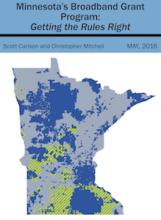Minnesota's Broadband Grant Program: Getting the Rules Right

In its first two years of implementation, the Minnesota Border-to-Border program distributed $30 million to 31 rural Minnesota communities. But the state has not put enough money into the program and needs to put more focus on getting investment in Greater Minnesota cities to spur economic development.
“This funding is essential to greater Minnesota communities that are being left behind,” says Christopher Mitchell, Director of the Community Broadband Initiative at the Institute for Local Self-Reliance. “The current disbursement is only meeting a fraction of the state’s high-speed Internet needs as it is. The program’s rules must be reconsidered to meet economic development goals for the state.”
"Getting the Rules Right" is a policy brief on the Border-to-Border Broadband program. It covers what the program is, how it works, and why funding must be expanded in order to serve more greater Minnesota communities.
Download the Report here [pdf]
Executive Summary
Since 2014, Minnesota has been promoting the expansion of high-speed Internet access across the state through its Border-to-Border Broadband Development Grant program. The program is intended to help bring high-quality Internet access to unserved and underserved areas in Greater Minnesota; without public support, these communities would continue to be left behind. In its first two years, the state awarded about $30 million to 31 Border-to-Border projects. The program has been well administered but should be modified in two significant ways.






